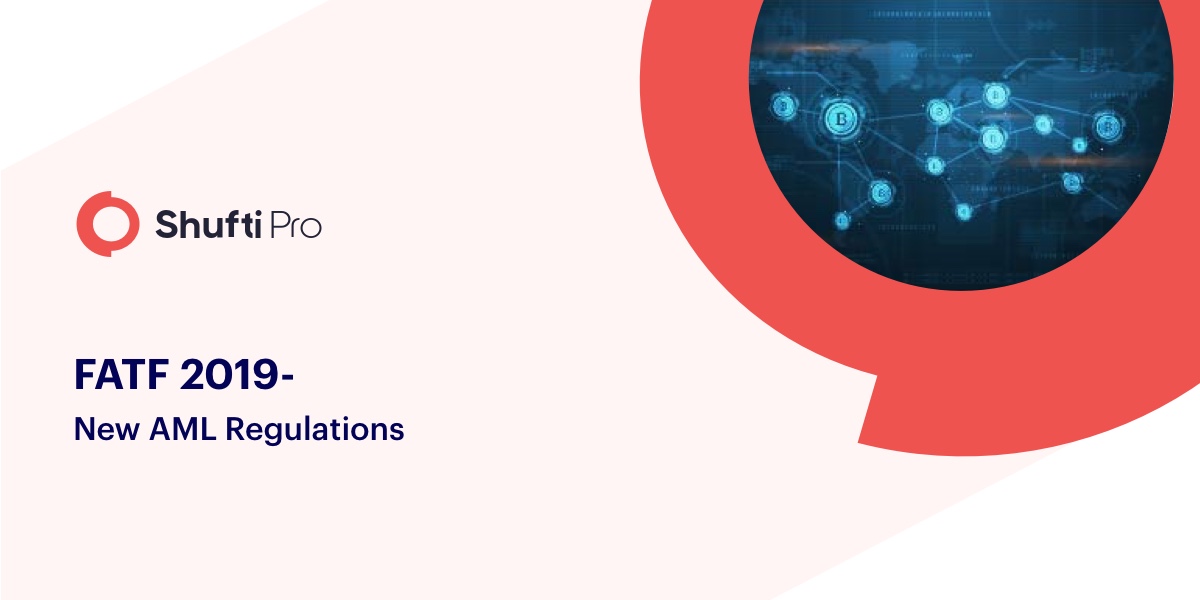AML Rules for Virtual Currency and Legal Sector – FATF 2019

Financial Action Task Force (FATF) is an inter-governmental regulatory authority. It was founded in 1989 to combat money laundering. In 2001 the authority also added terrorist financing in its regulatory framework. FATF works on through implementation of global AML regulations in its member countries and to research the money laundering and terrorist financing trends in the world. FATF also gives regulatory suggestions based on its research.
Money laundering and terrorist financing are becoming a threat to global economies. Billions of dollars are laundered annually around the globe. The cases like Swedbank and Danske bank proved that no business is too big to fail when it comes to money laundering. Regulatory authorities are introducing more rigid regulations to control crime. Real-time AML screening solutions are used by global businesses to cater to the risk coming from their diverse clientele and to insure thorough compliance.
FATF Crackdown on Cryptocurrency
The virtual currency has become a global phenomenon and has a global market worth $300 billion. Numerous cryptocurrencies are launched increasing the competition and loopholes for money launderers and terrorist financiers. Facebook also announced launching its cryptocurrency “Libra”. Which received criticism from 3 major European central banks.
The recommendations of FATF are based on the current global scenario of cryptocurrency. Cryptocurrency is globally exploited for money laundering due to a lack of regulations in this sector. Many cryptocurrencies are practicing in-house protocols like online AML screening solutions to deter frauds, but such practices are not centralized and leave loopholes within the industry.
As per the wall street Journal, FATF gave the recommendations for cryptocurrency regulation in June 2019. According to the new regulations, member countries are guided to register and monitor the cryptocurrencies on a regular basis.
The cryptocurrency businesses, exchanges are required to perform necessary KYC and AML verification processes on their clients and investors before serving them. Also, the cryptocurrency exchange and facilitators are required to report the transactions above the minimum transaction threshold. In order to keep track of crypto transfers, the crypto businesses are required to transmit the customer data to other financial institutions whenever making a transaction above $1000.
Industry and regulatory experts are working on developing a centralized system for transferring the data of customers. Also, FATF announced in June that it will conduct a 12-month review in June 2020 after analysis of member countries and concerned firms.
FATF Recommended Risk-Based AML for Legal Sector
Legal Professionals are exposed to a unique kind of risk coming from serving money launderers and terrorist financiers. FATF recommended new AML practices in June 2019, especially for legal professionals to cater to the risk of serving money launderers lingering within the industry.
The new AML recommendations of FATF are designed to address the risk faced by legal professionals and the firms that have legal professionals as clients. The new recommendations require the concerned parties to exercise more vigilant customer due diligence processes to mitigate the risk of serving criminals.
The guidelines will help to mitigate the risk through ongoing screening of clients of legal professionals. The recommendations suggest that legal professionals must pay heed to the identification and verification of ultimate beneficiary owners of the entities that they serve. In case the legal professionals serve a shell company it will affect their credibility by serving the money launderers in legitimizing their black money.
In-depth identity verification of clients will be the obligation of legal professionals. So it infers that the legal sector will have to face serious consequences in case of non-compliance.
What Cryptocurrency and Legal Sector Can Do About New AML Regulations?
After the new recommendations of FATF virtual currency and the legal sector will need to amend their KYC and AML protocols. The businesses in both sectors will have to do in-depth identity verification and AML screening of their clients.
The new recommendations of FATF are designed to fill the loopholes in the global industries and to mitigate money laundering and terrorist financing at a global level.
The virtual currency sector serves a global clientele and many legal professionals also have the same. AML & Kyc compliance will help them to mitigate the fraud coming from diverse clientele. Also, once a centralized process and protocols are designed for global compliance, businesses around the world will have a compact set of procedures to eliminate money laundering through joint efforts.
Once the virtual currency and the legal sector have streamlined their KYC/AML protocols at a global level it will introduce more growth opportunities in these industries. As all the countries will have the same rules and regulations so fraudsters will have no loophole to exploit and collaboration among businesses will be seamless.
Online KYC and AML screening solutions will help businesses in virtual currency and legal sectors to mitigate the risk in a feasible cost-effective way. It is not possible for the businesses to physically verify their global clients and to screen their Identity documents physically. Developing an in-house system for KYC and AML verification is costly and requires hefty resources so, outsourcing a KYC/AML screening solution is a feasible solution.

 Explore Now
Explore Now













